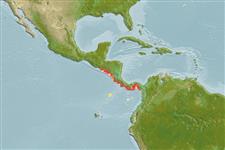Common names from other countries
Environment: milieu / climate zone / depth range / distribution range
Écologie
marin; saumâtre récifal; profondeur 1 - 70 m (Ref. 9313). Subtropical; 36°N - 4°N, 90°W - 77°W (Ref. 55)
Eastern Pacific: southern California, USA to Panama; rare north of Baja California, Mexico. There are unsubstantiated reports of this species from localities as far south as northern Peru.
Taille / Poids / Âge
Maturity: Lm ? range ? - ? cm
Max length : 91.0 cm TL mâle / non sexé; (Ref. 2850); poids max. publié: 9.3 kg (Ref. 40637)
Épines dorsales (Total): 10; Rayons mous dorsaux (Total): 13-14; Épines anales 3; Rayons mous anaux: 7 - 8. Preopercular notch and knob weak. Body and fins mostly red; sometimes with a blue streak under the eye. Young specimens are barred.
Adults inhabit inshore reef areas over hard bottoms. Generally solitary (Ref. 9313). Juveniles are sometimes encountered in shallow coastal waters and estuaries (Ref. 9313). Carnivorous, feed on invertebrates and fishes (Ref. 9313). Marketed fresh or frozen (Ref. 9313).
Life cycle and mating behavior
Maturité | Reproduction | Frai | Œufs | Fécondité | Larves
Allen, G.R., 1985. FAO Species Catalogue. Vol. 6. Snappers of the world. An annotated and illustrated catalogue of lutjanid species known to date. FAO Fish. Synop. 125(6):208 p. Rome: FAO. (Ref. 55)
Statut dans la liste rouge de l'IUCN (Ref. 130435)
CITES (Ref. 128078)
Not Evaluated
Menace pour l'homme
Harmless
Utilisations par l'homme
Pêcheries: commercial
Plus d'informations
Noms communsSynonymesMétabolismePrédateursÉcotoxicologieReproductionMaturitéFraiFéconditéŒufsDéveloppement de l'œuf
RéférencesAquacultureProfil d'aquacultureSouchesGénétiqueElectrophoresesHéritabilitéPathologiesTraitementMass conversion
CollaborateursImagesStamps, Coins Misc.SonsCiguateraVitesseType de nageSurface branchialeOtolithesCerveauxVision
Outils
Articles particuliers
Télécharger en XML
Sources Internet
Estimates based on models
Preferred temperature (Ref.
115969): 24.2 - 29, mean 27.7 (based on 28 cells).
Phylogenetic diversity index (Ref.
82804): PD
50 = 0.5000 [Uniqueness, from 0.5 = low to 2.0 = high].
Bayesian length-weight: a=0.01175 (0.00718 - 0.01922), b=2.95 (2.82 - 3.08), in cm Total Length, based on LWR estimates for this species & Genus-body shape (Ref.
93245).
Niveau trophique (Ref.
69278): 3.1 ±0.0 se; based on diet studies.
Résilience (Ref.
120179): Faible, temps minimum de doublement de population : 4,5 à 14 années (Preliminary K or Fecundity.).
Fishing Vulnerability (Ref.
59153): High vulnerability (56 of 100).
